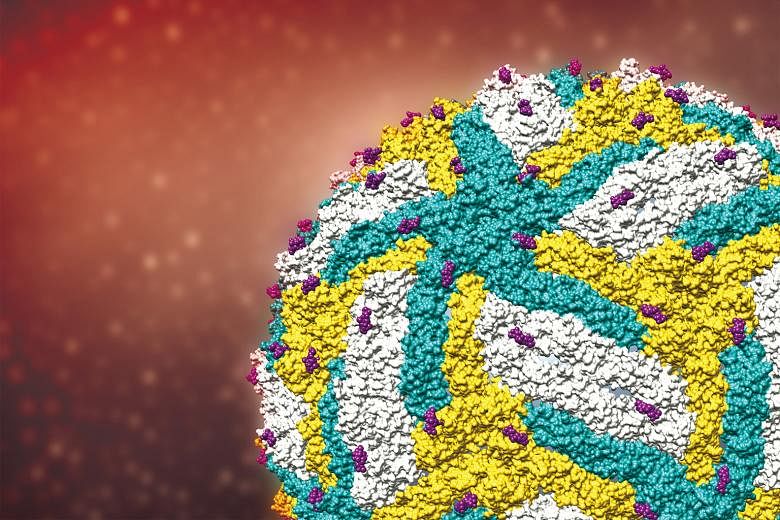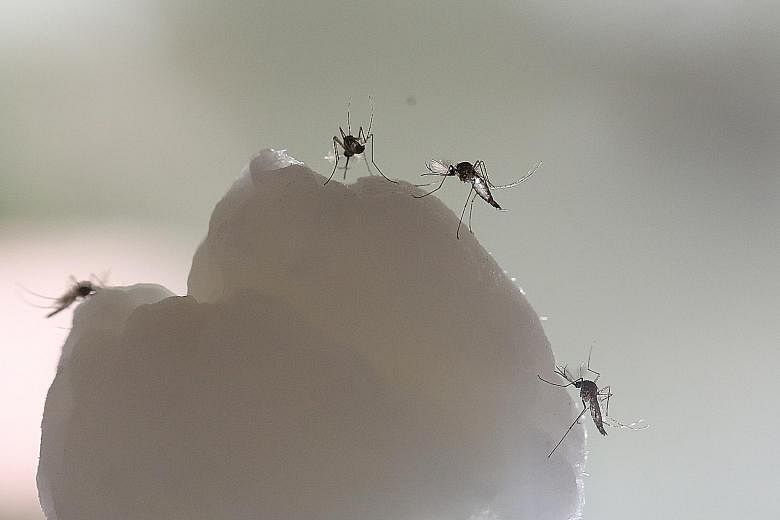Even as the flurry surrounding the Zika virus dies down, a new concern has emerged in the scientific community studying the virus at the cellular level.
According to a paper published last December in the international scientific journal Clinical And Translational Immunology, people who have developed immunity to dengue may develop a worse reaction to Zika, if they contract it later.
Zika and dengue are both flaviviruses that are transmitted by Aedes aegypti mosquitoes.
A person infected with either virus usually develops a fever, rash, joint pain and red eyes and, less often, muscle aches and a headache.
United States researchers studied cells of those who had contracted secondary dengue infections.
Such an infection occurs when a patient contracts dengue, after having developed immunity from a first infection.
Their laboratory experiments showed that having a Zika infection after contracting dengue is worse compared with just having a Zika infection on its own.
A cohort study of people who contracted Zika while having an immunity to dengue is currently under way in Brazil by a different team of researchers.
The result of this study is expected in one to two years' time.
The symptoms of Zika infections are generally milder compared with dengue's. However, Zika infections have been linked to microcephaly and Guillain-Barre syndrome.
"It is currently not known whether the enhancement of Zika infection with a pre-existing dengue immunity also leads to a more severe disease, such as microcephaly and related congenital abnormalities in infants, or Guillain-Barre syndrome in adults," said Florida Gulf Coast University Professor Sharon Isern. "But the worry is that it may."
Babies born with microcephaly have abnormally small heads, and may develop conditions such as intellectual disability and problems with speech and movement.
Guillain-Barre syndrome is a rare disorder in which a person's immune system attacks his nerves.
The research paper, published by Prof Isern and seven other scientists, is one of three supporting the hypothesis that a patient who has had dengue could develop a more severe Zika infection.
How exactly does having a prior dengue infection make a current Zika infection worse?
When a person is infected with a virus for the first time, his immune system produces antibodies to destroy it. The next time his body encounters the same virus, it produces the same antibodies to prevent illness. This is called immunity.
However, in the case of dengue, if a person is infected with another dengue serotype (there are four in total), his antibodies from the earlier infection will bind to the new virus serotype, but will not prevent it from infecting cells.
These antibodies will also carry the virus to immune cells not already infected by the new virus.
The process is called antibody-dependent enhancement (ADE).
Meanwhile, other experts have pointed out caveats to the latest findings.
Firstly, ADE happens only under certain conditions, said Professor Ooi Eng Eong, deputy director of Duke-NUS Medical School's Emerging Infectious Diseases Programme.
"There is enhancement but in a very narrow range. When you have too many cross-reactive antibodies, or too little, you don't get that enhancement," said Prof Ooi, who has studied ADE by simulating its effects using vaccines for Japanese encephalitis and yellow fever, both flaviviruses.
But if the environment is indeed favourable, this could mean a more sustained secondary infection, said Prof Ooi. If this is the case in a Zika infection, the chances of the virus crossing the placenta to the foetus could be higher, he added.
Secondly, scientists are unclear about the time gap between a dengue and a Zika infection, and its effect on the Zika infection.
For dengue, studies suggest that reactions to the virus are worse if the first and second dengue infections are more than two years apart.
Thirdly, dengue ADE studies show that a second infection could, instead, have a protective effect, said Professor Annelies Wilder-Smith of the Lee Kong Chian School of Medicine .
She added that in the first six months, and possibly up to 11/2 years after a person is infected, he could be cross-protected against the other dengue serotypes.
Prof Wilder-Smith said scientists have inferred that a reaction like ADE can occur between the dengue and Zika viruses, because the two show a similar make-up and also evolve in a similar fashion.
However, studies on ADE have provided varying results so it is premature to conclude what the actual interactions will be.
"What we now need, to complement laboratory-based studies, is to carry out prospective cohort studies," said Prof Wilder-Smith, who is leading the cohort study in Brazil.
But one thing is certain.
It is not easy to develop a dengue or Zika vaccine.
Said Prof Isern: "With both Zika and dengue vaccines, the challenge is to design a vaccine that elicits strong protection, without inducing an antibody response that could serve to enhance a natural infection.
"Care must be taken to include pieces of the virus in the vaccine formulation, which will elicit strong neutralising antibodies, and not solely enhance antibodies that coat the virus without destroying it."


